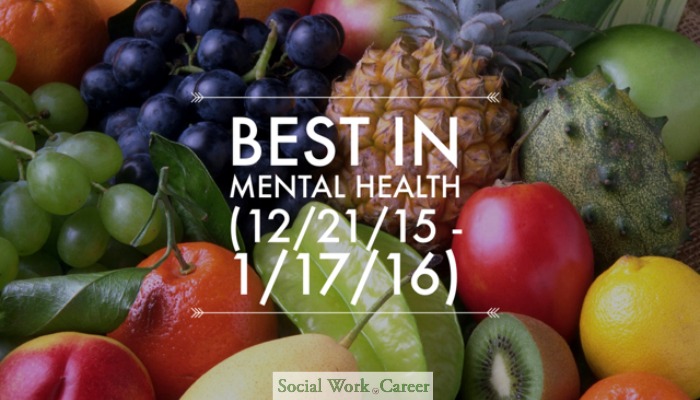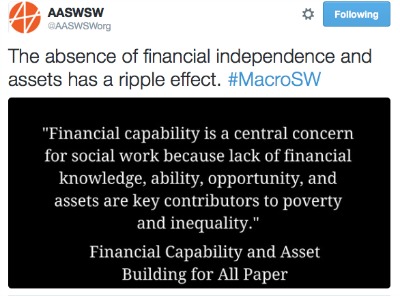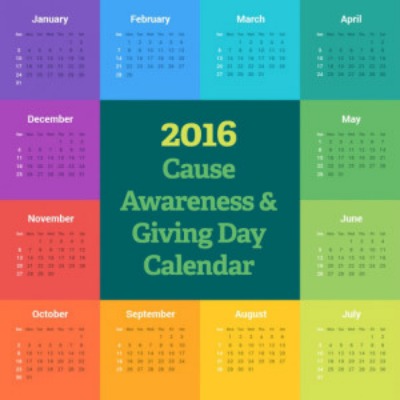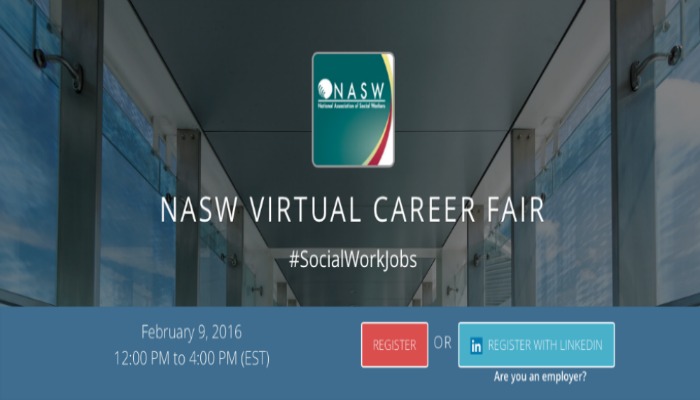 Mental Health Roundup
Mental Health Roundup
This contains some of the latest news in social work, healthcare, private practice and more! Unlike normal roundups, this one covers the last four weeks. It’s been a busy end/beginning of the year. I’m hoping it’s been a good one for all of you 🙂
JobSeekers: NASW’s Virtual Career Fair is coming up on Feb 9, 2016!
This week’s wrap-up has 5 main themes:
- Advocacy
- Technology and Mental Health
- Self Care
- Therapy
- Career/NonProfit/Private Practice
Advocacy
- Community Mental Health Today – Mary Sykes Wylie talks about how therapists today are increasingly more adept at seeing how the larger realities of racism and embedded poverty underlie/create mental illness clients while remaining attuned at the micro level.
- Community Revitalization: A Macro Field Education Experience – InSocialWork podcast with Megan Connelly, Elisabeth Preisinger, and Lidia Snyder discussing the experiences of a student placed in a macro-oriented, inter-professional setting.
- Mental Health Parity and Addiction Equity Act (MHPAEA) – Good Therapy – discusses how the federal law that requires group health care plans to offer mental health and/or substance abuse benefits on par with the medical and surgical benefits works.
- Race talk and facilitating difficult racial dialogues – Derald Wing Sue – The inability to honestly talk about race and racial issues can be a major roadblock in multicultural therapy. Strategies to facilitate dialogue about race include: understanding your racial/cultural identity, acknowledging your racial biases, and validating and facilitating discussion of feelings.
- The Top Twelve Grand Challenges Facing Society Today – as per Deona Hooper, include: Healthy Development for All Youth, Closing the Health Gap, Stopping Family Violence, Ending Homelessness, Harnessing Technology for Social Good and more.
- Here’s to a socially conscious new year– Kathryn Levy suggests six simple resolutions including: spending time educating yourself on social issues, stepping outside your “comfort zone,”developing empathy and more.
Technology and Mental Health
- 80% of mHealth Apps Vulnerable to HIPAA Violations and More – Michael Essay shares that 95% of FDA-approved apps lack sufficient protection, leaving them open to hacks that could result in privacy violations and theft of personal health information.
- Bringing Technology to Training – Beck Institute – Web-based therapist training programs are likely to increase access to CBT training and promote the development of competent cognitive-behavioral therapists.
- Cochrane…Masters of the (podcast translation) Universe! – Jani Ruotsalainen describes his journey to getting his podcast translated and provides resources for you to employ.
- Digital Identities & Literacy at @LSEpublicevents – Q & A with Bonnie Stewart – engaging in social media can help academics present both a professional and more complete profile, and expand networks; this is an advantage in today’s times with less secure employment.
- Evernote + Moleskine Weekly Planner Review – Ignacio Pacheco strongly recommends this combo to organize your work and homelife.
- HIPAA Secure Video For Education & Consultation – Sean Erreger shares with us an example of one of the excellent training videos created by ReelDX and Kartini to present a real case via video (with the patient’s permission) to inform in the area of eating disorders.
- How Psychology Is Adapting To The World Of Tech – Margaret Hannah describes a few online programs that have been developed such as a mental health and wellness program for children via Wayville, a virtual learning environment.
- Job Shadowing on Twitter – Laurel Hitchcock offers suggestions to other educators who would like to incorporate job shadowing as part of their class: find partners, locate tech-savvy professionals, pick a good hashtag and structure/prepare in advance some of your tweets.
- #MacroSW Financial Capability and Asset Building for All – twitter chat archive… for people to achieve financial security, they must be financially capable and able to accumulate assets… “Understanding the Nature of Poverty” & other resources.
- New issue of Journal of Social Media in Society – TSMRI’s open access journal includes articles about female images and the curation of self on pinterest, the use of Facebook as a campaign tool and more.
- A New Startup Focusing on Minecraft & Social Emotional Learning – Mike Langlois, LICSW announces the startup of Grokcraft, a “Minecraft server, learning lab, & community where parents, kids & professionals engage in playful collaborative social-emotional learning (SEL.).”
- The Secret to Safety on Anonymous Apps – Justin W. Patchin – Teens are drawn to anonymous apps out of a desire to chat with friends without adults always in the room . Parents are advised to teach their children to use all technology tools safely and responsibly vs. chasing down the latest app or platform.
- Suicide, Schools, and Social Media – To prevent suicide deaths among students, Jonathan Singer proposes using technology as an aide and to consider (as per anthropologist dinah boyd’s guidelines) to be accessible online.
Self Care
- 4 Lessons from my most creatively productive year ever – Lisa Mitchell – recommends slowing down making little choices. This, in turn, will help us slow down for bigger creative endeavors. Schedule time for incubation, yet embrace structure and accountability.
- Mindfulness for Beginners – Jon Kabat-Zinn talks about how increased self-awareness enables us to know more of what is in our minds and how each of us are like universes, boundless.
- Nourish, Simplify and Charge! [own] – three words/ideas that you may benefit from and how to start engaging in this self care and professional recharge this year.
- A Therapist’s Prescription for Better Mental Health – Sharon Martin provides a self care “to do” list such as treat yourself with kindness, say no when you need to, step out of your comfort zone and more.
- What Barbara Ehrenreich Gets Wrong about Gratitude – contrary to Ehrenreich’s “selfish” or “luxury of the privilege” interpretation of gratitude, Jason Marsh shows how its practice fosters a deeper connection with others, leads to greater generosity, and increases resiliency.
Therapy
- A Brilliant Grief Resolution Example – Steve Andreas shares a powerful technique that Ron Soderquist used to help a client out of her deep disabling depression that resulted following her miscarriage.
- Childhood bullying and mental illness in young adulthood – from the research, Jasmin Wertz concludes that victims of bullying are likely to experience mental health problems as they mature, and bullying behavior is often indicative of underlying mental health issues.
- Children and their emotions – All in the Mind podcast – Anxiety is one of the more common mental health problems for kids; 30% to 40% of the variance in symptoms is because of genes. Environmental components increase a child’s chances of developing anxiety. One effective strategy is to break down a situation they’ve been avoiding into really small steps and get them to gradually approach the situations that they’ve been scared of.
- Eco Spirituality and Nature-Informed Therapies–Part 1 and Part 2 – as per Cheryl Fisher, spending time in nature is a restorative activity; hence providing therapy in this environment may also be beneficial for clients and she shares some ways to do so (including office).
- The Emotional Impact Of Miscarriage – Amanda Itzkoff, MD – 15-20% of confirmed pregnancies end in miscarriage; having a miscarriage is a very unique form of loss that requires a mourning process.
- Get to Know Your Money-Self With My Money Myself! – Reeta Wolfsohn is offering a free webinar on Jan 21 at 2PM EST, about connecting to the money thoughts, feelings and actions that create your financial circumstances.
- Implementation and Significance: Simple Psychotherapeutic Interventions – Wynn Schwartz discusses how psychotherapy entails helping people get more comfortable with doing things differently, by inviting them to expand their range of possibilities.
- Interactive Journaling: A Therapeutic Writing Tool – Jess Williams’ interviews Steven Proctor, Ph.D about this structured method of helping clients through the process of making a positive life change, included in the NREPP (National Registry of Evidence-based Programs and Practices).
- Should I Learn EMDR or PC? – Trauma Institute – “PC appears to be about as effective as EMDR, at least as well tolerated, and considerably more efficient.”
- Specific Learning Difficulties: What Teachers Need to Know – an interview with author Diana Hudson; “Early identification of SpLD makes a huge difference… be aware of the student’s strengths and try to work with them, where possible to achieve the learning objective.”
Career/Non-Profit/Private Practice
- 2016 Cause Awareness & Giving Day Calendar – Heather Mansfield provides a helpful calendar/list of causes’ event days to help you choose which ones are most relevant to you/your brand.
- Creating an E-Course – Part 1 and Part 2 – Selling the Couch podcast reviews all steps involved in creating your own e-course from planning and researching to looking at your expertise, passion, and areas of demand, finding an audience, recording, distribution and pricing.
- Expanding into Group Practice: Does it Make Sense – Miranda Palmer discusses some of the different factors that go into calculating your ROI in terms of bringing in 1 (or more) therapists into your practice, illustrating the often required initial investment (or loss).
- How to Master Your Video or Phone Interview – for video interviews, Helen Evans advises looking into webcam to maintain eye contact, sitting with your back straight and ensuring that you’re not too close to the webcam.
- Tidying Up Your Professional Life and LinkedIn Connections – Beth Kanter provides guidance on how you may apply Kondo’s simple tidying principles to your worklife and ever-growing network of online connections.
- NASW Virtual Career Fair – Feb 9 at 12-4PM EST register to connect directly with employers with open career opportunities from the comfort of your home, office, smartphone or tablet.
- Private Practice for Social Workers – Jonathan Singer’s podcast interview with Dr Julie Hanks – key ingredients for a successful private practice include: identifying your “big message;” building relationships online and offline, knowing what you’re good at and outsourcing what you’re not good and more.
- The Promise and Peril of an “Outcomes Mindset” – Patrick Lester explains how external factors, cream skimming, gaming and fraud, tunnel vision and superficial/short-lived outcomes skew outcome-based results.
Like this post? Please share it!





